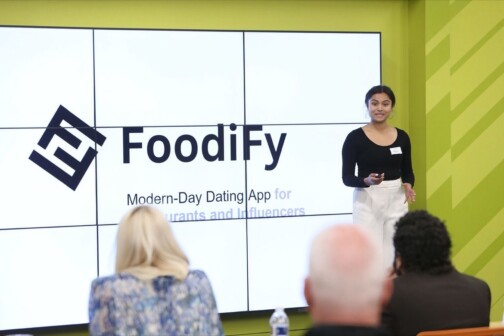When Caroline Brooks first heard the word “peptide” in 2016, she didn’t exactly know what it was. Later, she would be the CEO of a Fort Worth peptide company on her way to disrupting how we manufacture peptides.
Brooks took the circuitous route to the biotech industry. Her engineering background led her to the consulting world, working for Accenture and Deloitte before leading the Global Business Unit at Hewlett Packard. She was on her way to a comfortable retirement when an idea for a business came across the desk of her son Carder, who was a law student at Texas Tech and worked in the office of research and commercialization. There, it was his job to evaluate technology created by professors and students to see if the innovations were commercially viable and worth investing in patenting.
Her son had enough biotech background to understand the chemistry behind the peptide innovation, which was invented by Dr. Cole W. Seifert and Dr. Guigen Li, a distinguished Paul Whitfield Horn Professor at Texas Tech University. He saw it as a worthwhile investment opportunity and brought it to his family.
The intellectual property was a way to produce peptides, which are small strings of amino acids that occur in nature and are used in countless industries, including agriculture, cosmetics, and in nutritional supplements. The researchers found a way to synthesize peptides more efficiently in a smaller footprint and with less specialized equipment, which was also greener than other peptide syntheses.
Brooks and her husband had long dreamed of owning their own business but hadn’t found anything that felt like a good fit. But the family connection and the opportunity enticed her. “My career path gave me incredible exposure to a wide variety of business types and operational areas, and that combination of experience was exactly what was needed when the company was formed,” she says.
So rather than invest in the company, Brooks jumped in with both feet as CEO. Incorporated in 2017, GAPPeptides benefitted from tech accelerator TechFW, which is celebrating its 25th anniversary this year. The TechFW network helped the company navigate the rough waters of a new biotech company, providing guidance and expertise when needed.
GAPPeptides stands for Group Assisted Purification Peptide Synthesis and initially launched with the idea of building a library of peptides that could be used for research purposes by universities and organizations. The company hired Seifert and Carder to bring on subject matter expertise. “I don’t have a background in chemistry, so I have learned a lot about trusting the members of our team and giving them the freedom to make decisions,” Brooks says.
Working with family is never easy, but the Brookses seemed to navigate it smoothly. “You have to keep the family versus the business in perspective in business settings,” she says. “We didn’t always see eye-to-eye from a business perspective, but we always see eye-to-eye coming from a family perspective, and it worked out great.”
However, the company soon realized that universities and start-ups wouldn’t provide the requisite revenue stream, so it considered manufacturing the peptides on a larger scale. But the capital required for that direction proved to be too great. Instead, GAPPeptides patented a process to create peptides that can be applied to several products and attracted enough attention to be the object of an acquisition in 2022. GAPPeptides joins ZS Pharma, Encore Vision, and Exact Diagnostics as former TechFW exits.
Brooks isn’t able to share many details about the acquisition but says the technology is currently being used in pharmaceuticals and cosmetics. Looking ahead, the process could be used to create peptides used in nutritional supplements, food products, agriculture, or veterinary medicine. In any case, the exit helped her retire as day-to-day CEO, though she still manages the business as an operating unit.
But Brooks might not be retired for long, as she may have been bitten by the entrepreneurial bug. “I am certainly open to opportunities to repeat the experience,” she says. “It has been an incredible learning experience of development and growth. It’s the hardest job I have ever had, but by far the most energizing and satisfying.”
Author







